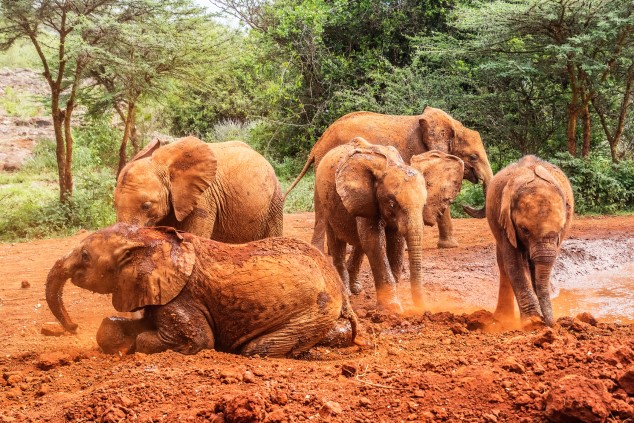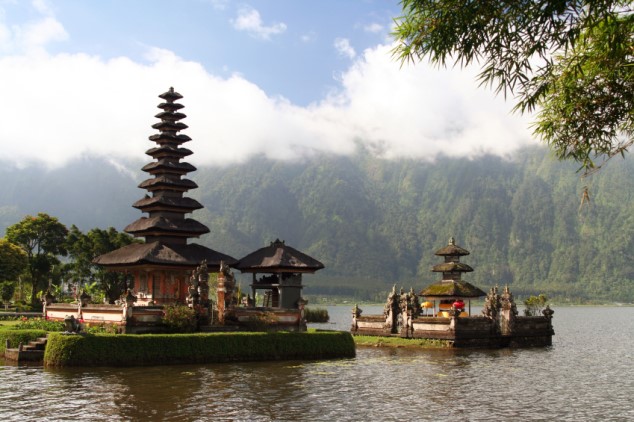In the series “Off Duty”, various members of the InterNations team share their personal stories about a global lifestyle and the international experience.
For this post, we have talked to Christian, our Team Lead Member Relations, who grew up as a so-called “third-culture kid” (TCK for short).

What exactly is a third-culture kid?
I’d define it as someone who spends their formative years growing up outside of their parents’ — and their own — culture. I personally identify with the term. It is a bit of an unusual experience, but it affects more than a few children. It’s distinct enough to deserve its own label.
Can you tell me more about where you’re from and where you grew up?
I grew up in a small Bavarian village with fewer than 1,000 residents, next to one of the beautiful lakes south of Munich. When I was eight, though, I moved to Nairobi, Kenya, with my parents and my two younger sisters.
My father used to work for a German NPO, a think tank and political organization. One of its departments focuses on international contact, cooperation, and development aid. As my father had a large personal network, he was often asked to recommend candidates for international assignments. One day, quite suddenly, he decided to try it himself and work abroad for a while.
Originally, my parents had planned to stay abroad for just a few years. My father set out with a three-year contract, which was later extended: In the end, they spent nearly 20 years abroad, first seven years in Kenya and the rest of the time in Indonesia.
We relocated to Jakarta when I was 16, and I stayed there until it was time for me to attend university. My parents even lived there for more than a decade. They decided to return to Germany about four or five years before my father officially retired.

How did you feel about moving so suddenly to such a faraway place? What was it like?
As a kid, I pretty much took it for granted. It was a decision my parents made and that I wasn’t involved in, so I just went along with it. I don’t even remember the day we arrived in Kenya: a moment like that might be expected to stand out, but no. I mostly remember it was a bit like going on an extended vacation in the beginning: before finding a place to live, we stayed at a hotel in Nairobi, and my sisters and I were really excited about having our “own” pool to splash and swim in every afternoon!
I think I was in the right place at the right time, or rather at the right age. Spending my childhood in Nairobi was pretty much ideal: The climate in the capital is warm, but because of the high altitude, it’s not as tropically hot as in other parts of Kenya. There are lots of outdoor activities to enjoy, with all the amazing scenery and wildlife right outside the city. I vividly remember watching a herd of elephants on a field trip, less than an hour from our house.
I had very strong feelings about moving to Jakarta as a teenager, though. It felt a lot more like being “uprooted” than going to Kenya in the first place. Losing all your friends from school seems horrible at that age when each friend is basically your BFF.
However, things turned out to be all right — and not just because Nairobi then had little entertainment to offer for teens and young adults. It was far less safe than Jakarta, too. My sisters and I were much more independent as expat kids in Indonesia. We could just call a cab and go anywhere on our own. In Kenya, this kind of freedom wouldn’t have been possible.

Is there such a thing as the “expat bubble”? Did you ever feel isolated from local life?
Unfortunately, the “expat bubble” can be very real, depending on where you live. In Nairobi, most expats, just like their wealthy Kenyan neighbors, lived in gated communities, surrounded by high fences, guard dogs, and security staff. We were warned about muggings, robberies, and car-jackings, and there were entire parts of town where you just didn’t go if you were obviously a foreigner or obviously rich.
In Kenya, I also had fewer opportunities to make local friends at school. I went to a Deutsche Auslandsschule (a German school abroad), an international school mostly catering to students from German, Swiss, and Austrian expat families. There were a few students from German-Kenyan families around, but most Kenyan parents who want their kids to get a private education send them to an English-language school.
Ironically, it was a lot easier to find Indonesian friends in Jakarta, although the German school wasn’t even permitted by Indonesian law to accept local students back then. There were, however, quite a few students of German-Indonesian descent at the school, and getting to know them, you’d meet their extended families, friends, and neighbors, too.
Generally speaking, life in Jakarta felt far less isolated than in Nairobi. The Indonesian capital is the most affluent part of the country, and as a result, the difference between the rich and the poor, or between expats and local residents, was less pronounced, nothing like our gated community in Kenya.

The Jakarta skyline at sunrise
What were the particular challenges of life as a third-culture kid?
One of the biggest challenges I faced as a TCK was actually coming back to Germany. On the one hand, I still had plenty of local ties here — relatives other than my parents and sisters, friends I’d made in kindergarten, former neighbors from our village, and so on.
But while the language barrier was obviously not an issue, it took me some time to readjust to life in Germany. I’d been born in Germany, I spoke fluent German, but I didn’t feel particularly German, whatever that means. I had to learn the unwritten rules of everyday life all over again, just as if I’d moved to yet another foreign country.
“Reverse culture shock” does exist, and it’s probably one of the reasons why I never joined an academic exchange program or applied for an internship abroad during my years at university. My peers were kind of looking to broaden their horizons, while I was busy figuring out how to settle in.
Now I do consider Germany my home: Since my father retired, I’ve no longer been making regular trips to Jakarta, and I have lived here in Bavaria longer than anywhere else. My two sisters might define “home” differently, though: one has married a US citizen and moved to Wisconsin with him; the other one — the youngest — was just a toddler when we arrived in Kenya and barely has any childhood memories of Germany at all.

The last time Christian went to Indonesia, he attended a wedding on Bali.
And how did you benefit from your unusual childhood?
Well, there are some more obvious and superficial answers to this question. Language skills, for example: I still speak some Bahasa Indonesian, even if I’m not fluent. But I think I’ve also benefitted from my experience in other ways.
I’ve learned to put things into perspective and be grateful for the kind of life I have here in Germany. There’s a reason why the phrase “first-world problems” was invented!
And it’s helped to develop some personality traits I value highly: I’m the kind of person who prefers listening to talking, who takes in new situations and learns how to adjust, who finds it fairly easy to keep calm and avoid getting stressed. That also comes in handy if you work in customer service, like I do.
Lastly, my background as a TCK played a certain role during the application process for my job here at InterNations. I actually hadn’t heard about the company before, but I immediately took to the idea of a global expat network. In an ideal world everyone would just settle in and feel at home anywhere in no time. In reality, it takes time, effort, and sometimes a little help — which InterNations can provide.

Christian in one of our meeting rooms during the interview
What kind of impact does the TCK experience have on your life right now?
I no longer go to Jakarta that often after my parents came back to Germany. Before my father retired, though, I’d spend most major holidays, like Christmas, with my family in Indonesia.
I also keep in touch with quite a few friends from high school: Deutsche Auslandsschulen (German schools abroad) are often small, tight-knit communities, where it’s easy to become friends with more people than just the kids from the same grade. I just texted a friend who’s returned to Jakarta as an adult while I was sitting on the Munich underground this morning! And the last time I’ve been to Indonesia, it was to attend a Chinese-Filipino-Indonesian-German wedding on Bali a couple of years ago.
I’ve only been back to Nairobi once, just one year after we’d left. My parents, my sisters, our spouses, and I had big plans to go back and (re-)visit all the places from our childhood memories in 2017; however, this trip was canceled because of travel warnings before the general elections. Fortunately, the unrest surrounding the election didn’t turn out nearly as bad as predicted, but this trip down memory lane is still in the cards.
Right now, I don’t have any concrete plans for living or working abroad. But if the opportunity arose — and if it was possible to balance my own job and my wife’s career, expat life and starting a family — I would at least think about it. I could even imagine raising children as an expat parent: after all, I’d absolutely recommend the TCK experience!
Photo credits: InterNations / iStockphoto
Hello, an interesting article. Actually, Christian’s childhood seems quite similar to mine. My family and I moved to Kenya when I was five and at 14 I moved to Hong Kong….. I will be writing an article soon with loads of old pictures on my new travel blog.
Enjoyed reading your article.
Cheers!
Super interesting! Thanks for sharing your experience!